
Boss Doesn’t Allow Employees To Work From Home Under Any Circumstances, So They Make Sure They Can’t Be Reached Out Of Office
Remote work. Flexible work. Working from home. Whatever you might call it, the widespread phenomenon is still something that many bosses and managers can’t stomach. Many of them want their workers back at the office for a wide range of reasons: whether it’s stubbornness, the desire for control, or having people attend meeting after meeting in person.
The problem is that this inflexibility on their part is causing a lot of friction with their employees. After all, many white-collar workers have had three years’ experience working remotely and getting similar results as they would if they commuted to the office.
A redditor who works in the IT field recently went viral on the r/antiwork subreddit for sharing how they had to travel to the office even during a snowstorm. They were told that they couldn’t work remotely at all, so they decided to follow that edict to the letter. Scroll down to check out their full story, as well as the discussion about WFH that they started online.
Working from home is a divisive issue in many companies
Image credits: Pavel Danilyuk (not the actual photo)
One IT worker recently went viral after sharing how remote work wasn’t a possibility even during a massive snowstorm
Image credits: Glenn Carstens-Peters (not the actual photo)
Image credits: anon
The OP shared how they decided to delete Microsoft Teams and their email from their phone so that they wouldn’t be available after hours anymore. They also ensured that nobody would ‘bother’ them with meetings outside of office hours.
It was their way of fighting back against the rules regarding remote work. The irony is that because the redditor works in IT, they do everything remotely either way.
Their post went viral on r/antiwork, getting over 30k upvotes, and inspiring other working redditors to share their own WFH stories, and how they fought back against draconian rules. As it turns out, it’s quite impractical to have an approach where everyone’s supposed to be in the office every single day. There’s a lot of wasted time and resources there. You’re not just burning time and fuel while commuting to the office. You’re also spending more on food (if you’re not bringing your lunch box to work), and sacrificing the time you could spend with your family to make your boss and boss’ boss happy.
One particular thorn in many employees’ side is the number of meetings they have to attend at work, whether in person or remotely (e.g. via Microsoft Teams or Zoom). Quite a few employees feel like these meetings are more or less pointless and only serve to eat up everyone’s precious time. However, things might not be as straightforward as they seem. Bored Panda got in touch with Anna and Sarah, the hosts of the ‘Work Wives’ podcast, with a few questions about the pressure to attend meetings and how to communicate with managers well.
They explained to us that it’s not all black-and-white when it comes to meetings, and management isn’t always to blame. Meetings, just like other face-to-face (or remote) interactions, serve a purpose, even if it doesn’t feel like it. However, if things are getting out of hand with any situation at work, it’s best to bring up the issue, get together with your manager, and try to solve it together! That’s far more preferable to ignoring problems.
“Look, there is definitely often room for a bit of streamlining in our time management at work! That said, some people learn differently from others and so what might feel pointless to you may actually be very useful to someone else in that meeting,” Anna and Sarah, from the ‘Work Wives’ podcast, pointed out to us.
“Sometimes, we need to repeat and refine until we get things right and other times, it’s a case of needing to rehash the same info enough times that it actually gets through to everyone! Sure, this can be super frustrating, but it’s sometimes just a necessary evil. And if it’s not—do something about it!” they urged employees to take action.
“We’re really big advocates of the ‘help me help you’ approach. As in—if something isn’t working for you, stop complaining about it and get off your butt to do something about it. Maybe management would really appreciate some constructive (and kind!) feedback about how to better streamline their meetings. You have a better idea? Why aren’t you sharing it?” they advocated for a more proactive and collaborative approach at work.
“Help your team to help you and ask for something better if you want something better. Work together with your managers to make the most productive environment for everyone and, who knows, you might score some brownie points in the promotion stakes!” they said that managers value employees who are problem-solvers.
Here’s how some readers reacted to the post about remote work
Just like anything else, working from home has its pros and cons. It’s not the all-encompassing force of good that some employees think it is. Neither is it as completely evil as some managers would love you to think. For example, some managers might feel that it’s far harder to train new employees remotely. And it’s generally true. New workers can have a harder time keeping up and learning new things. It’s also harder to form emotional connections with someone you haven’t met in person.
Meanwhile, some managers think that their employees might be slacking off at home. However, research shows that the average employee is productive for fewer than 3 hours each day. Meaning that even if they’re at the office, most people are just really good at pretending to work, not actually working: there’s a lot of time spent doing anything else, from reading the news to checking social media.
Some chronically overworked employees feel that they can do the job they’re meant to do quicker while at home. When they’ve done everything on their to-do list, they move on to other things, taking back control of their lives, and establishing a healthier work/life balance. That might mean cooking healthier food at home or spending more time exercising. Things that they might otherwise not have the time and energy to do after being caught up in a traffic jam on their way back from the office.
However, WFH only works if the employee actually gets proper results. If they’re actually slacking off and avoiding work, there’s no excuse for that. And in that case, it might be worth considering whether they can function best when physically surrounded by other colleagues at an office. Or, in short: different employees tend to do their best work under different circumstances. Some have the self-discipline to do whatever they need to do, wherever they are. Others need fewer distractions and more managerial oversight.
A hybrid approach to remote work can help balance out the downsides and focus on the upsides. For instance, the company might consider downsizing its office and saving on rental costs. Meanwhile, less time spent at the office means less time spent gossiping and being involved in interpersonal politics. Though, that comes at the expense of greater bonding with your coworkers.
At the end of the day, what truly matters is good communication, transparency, keeping everyone on the same page, and setting realistic expectations. Without these things, it doesn’t matter if the company is fully-remote or forces its workers to be on-site at all times. Working from the office doesn’t automatically that everyone communicates well; working remotely doesn’t mean that everyone is detached and apathetic. It all depends on how the employees and their managers approach everything.
Meanwhile, other internet users shared similar stories about managers who don’t want their employees to work remotely
I genuinely don't get it. Especially the comment about bad managers being a feature not a bug. If you have contented employees you will make more money. It's a simple equation: profit = income - expenses. Disgruntled staff leave. It costs money to hire and train replacements. This is an expense. If you keep your existing staff happy, they won't leave and it's am expense you won't have, so your profit will go up without anyone needing to do anything to the income column. In fact, happy employees are more likely to do the occasional "above and beyond" which could even increase income. More income, fewer expenses, more profit to go to the shareholders. Why do so many C suite execs fail basic maths? Give a little, gain so much more.
Mediocre managers can be acutely aware of when they add nothing to productivity (particularly when they are also mediocre people). They compensate by busting balls of their team, believing that this will drive staff to achieve more (or will at least create the illusion of action by those mediocre managers). Instead, these managers actively reduce productivity.
Load More Replies...Companies want you in office and working exactly scheduled hours because they don't want you to connect the dots: we are not paid in relation to the value we're creating! We are paid arbitrarily and grossly below the value we're creating. That is why they don't want us to see how much we actually work and don't want to acknowledge the effectiveness and efficiency of our work. It's hard to argue paycuts or not paying a living wage when you actually evaluate people's work output. One single employee nowadays does more work than our parents and generates sometimes five times the income. That's why companies make record profits right now. But they absolutely refuse to share that with the people who make those profits and generate that income. By insisting on time served and place of work, they diffuse attention away from the workers value in a company and the gain they have from the work.
Our office was recently acquired by a new company. They stated they wanted everyone in the office at least one day a week, preferably more. Their reason is that we work better when everyone can be in the same place. My problem is that there are so many people that socialize in the morning, it's a distraction. Then the people that stop by every hour on the hour to ask a question that could easily have been an email or expect you to drop what you are doing to answer a question that could have waited. So let's rephrase that...If I go into the office, YOU get more done, I don't....and that will be really fun to explain come review time. Plus, I get more done when I have my kitchen there, I can wear what I want and listen to my own music.
Same here, but at least, we don't have to go more than 1 day per month. I'm a translator. It's a solitary job best done in silence. Chit chat is counterproductive. Even though I'm more productive in the office as I try to concentrate very hard to tune out people and the horrible grey cubes and concrete buildings, I'm exhausted and mentally drained, so the following day, I produce less. Plus, I'm resentful towards my colleagues who chitchat all day long. Oh, and I have to leave before 7 am to make it to the office for 9, because I live far away. And I'm an introvert, so being forced to socialize with people I hardly know is draining.
Load More Replies...I genuinely don't get it. Especially the comment about bad managers being a feature not a bug. If you have contented employees you will make more money. It's a simple equation: profit = income - expenses. Disgruntled staff leave. It costs money to hire and train replacements. This is an expense. If you keep your existing staff happy, they won't leave and it's am expense you won't have, so your profit will go up without anyone needing to do anything to the income column. In fact, happy employees are more likely to do the occasional "above and beyond" which could even increase income. More income, fewer expenses, more profit to go to the shareholders. Why do so many C suite execs fail basic maths? Give a little, gain so much more.
Mediocre managers can be acutely aware of when they add nothing to productivity (particularly when they are also mediocre people). They compensate by busting balls of their team, believing that this will drive staff to achieve more (or will at least create the illusion of action by those mediocre managers). Instead, these managers actively reduce productivity.
Load More Replies...Companies want you in office and working exactly scheduled hours because they don't want you to connect the dots: we are not paid in relation to the value we're creating! We are paid arbitrarily and grossly below the value we're creating. That is why they don't want us to see how much we actually work and don't want to acknowledge the effectiveness and efficiency of our work. It's hard to argue paycuts or not paying a living wage when you actually evaluate people's work output. One single employee nowadays does more work than our parents and generates sometimes five times the income. That's why companies make record profits right now. But they absolutely refuse to share that with the people who make those profits and generate that income. By insisting on time served and place of work, they diffuse attention away from the workers value in a company and the gain they have from the work.
Our office was recently acquired by a new company. They stated they wanted everyone in the office at least one day a week, preferably more. Their reason is that we work better when everyone can be in the same place. My problem is that there are so many people that socialize in the morning, it's a distraction. Then the people that stop by every hour on the hour to ask a question that could easily have been an email or expect you to drop what you are doing to answer a question that could have waited. So let's rephrase that...If I go into the office, YOU get more done, I don't....and that will be really fun to explain come review time. Plus, I get more done when I have my kitchen there, I can wear what I want and listen to my own music.
Same here, but at least, we don't have to go more than 1 day per month. I'm a translator. It's a solitary job best done in silence. Chit chat is counterproductive. Even though I'm more productive in the office as I try to concentrate very hard to tune out people and the horrible grey cubes and concrete buildings, I'm exhausted and mentally drained, so the following day, I produce less. Plus, I'm resentful towards my colleagues who chitchat all day long. Oh, and I have to leave before 7 am to make it to the office for 9, because I live far away. And I'm an introvert, so being forced to socialize with people I hardly know is draining.
Load More Replies...
 Dark Mode
Dark Mode 

 No fees, cancel anytime
No fees, cancel anytime 













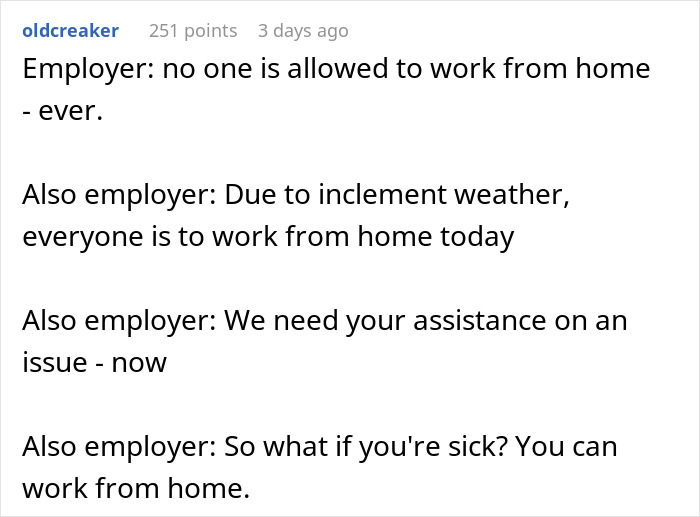


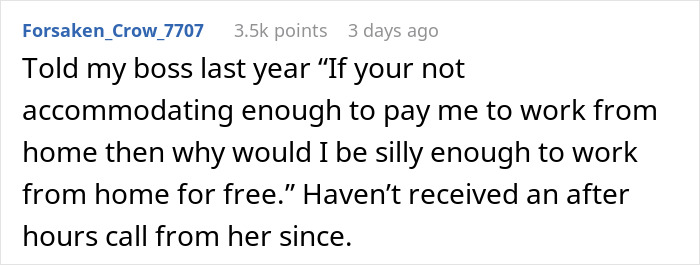





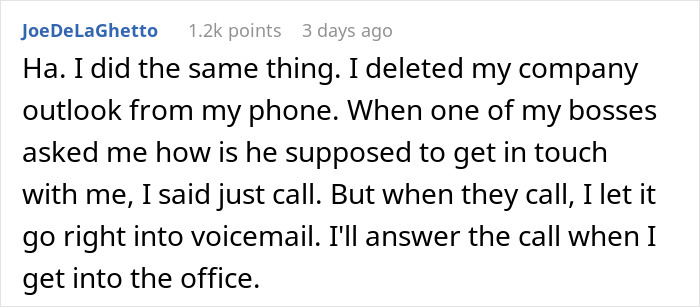
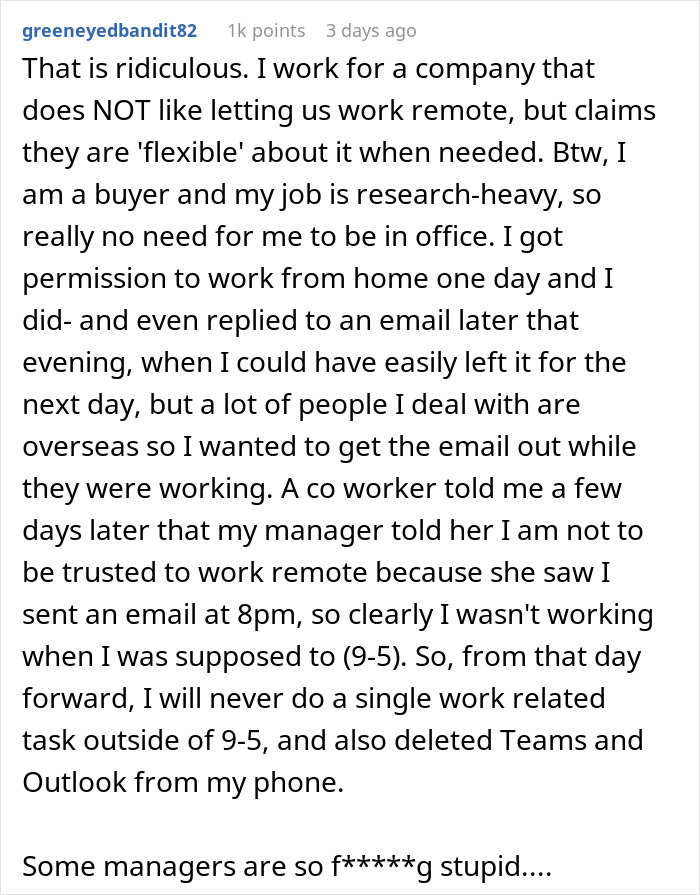



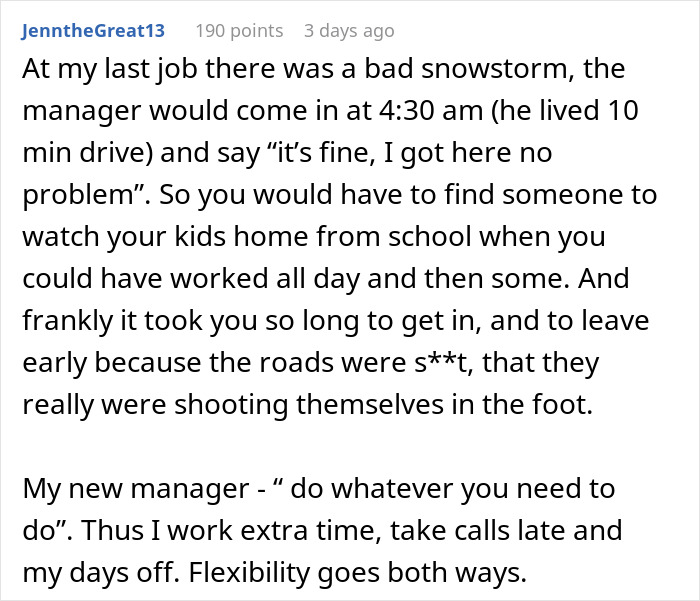
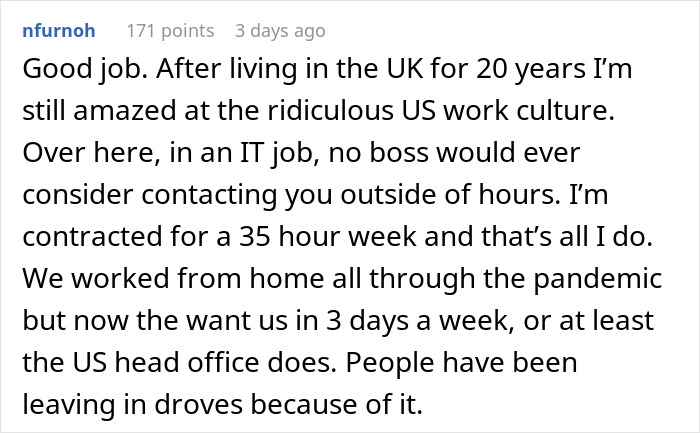
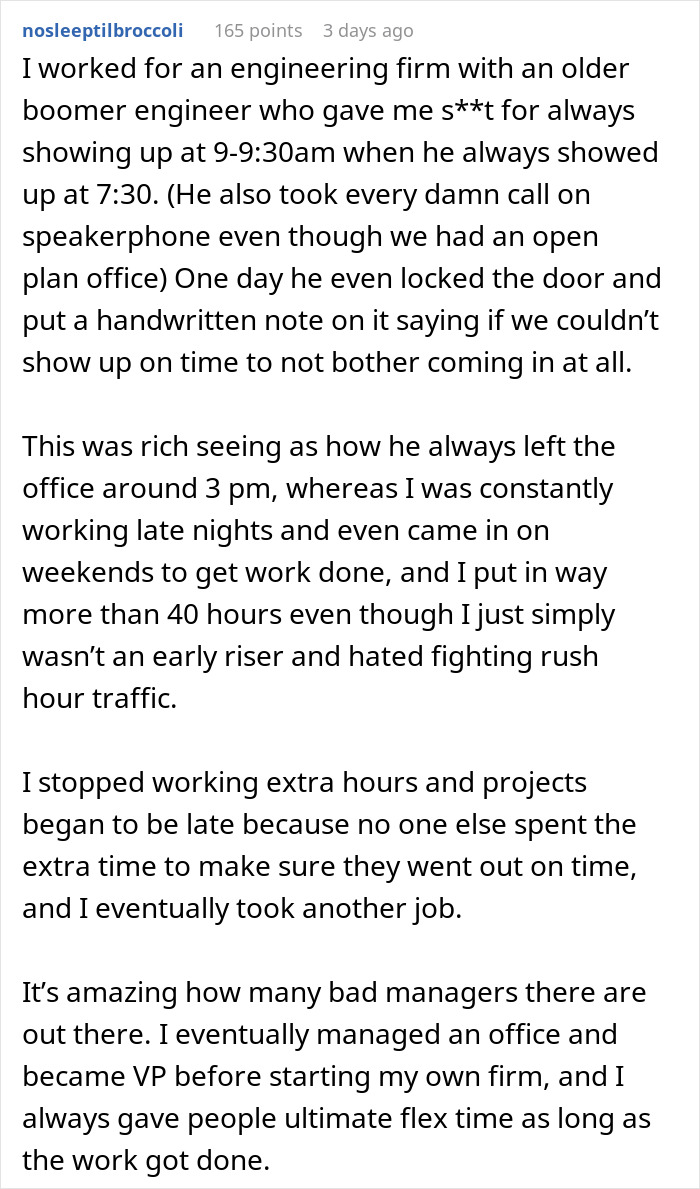
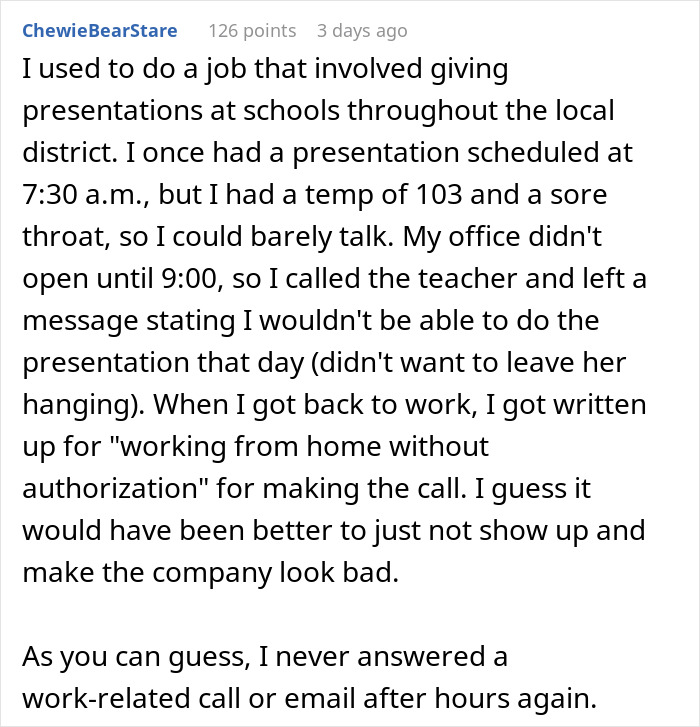














































105
37